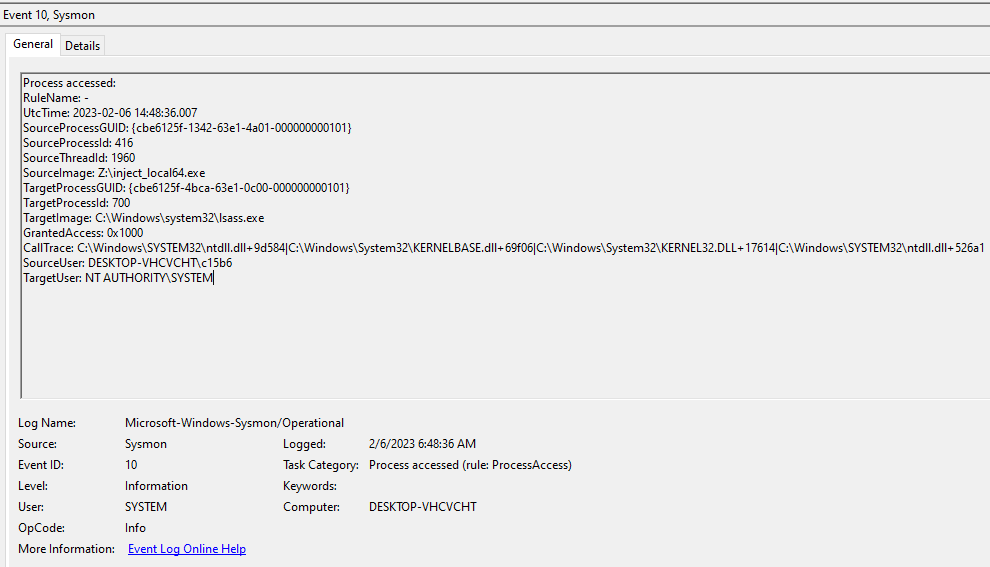Yet another "Call Stack Spoofing" implementation. Works for syscalls and APIs, supports x64, x86 and WoW64.
Compile
Use the MinGW compiler:
This should create two binaries:
$ ls dist
hw_call_stack.x64.exe hw_call_stack.x86.exe
Example output
PS C:\Windows\Temp> .\hw_call_stack.x64.exe
usage: C:\Windows\Temp\hw_call_stack.x64.exe <pid> <dll>
PS Z:\> .\hw_call_stack.x64.exe 700 kernel32.dll
-- HW Call Stack --
calling NtOpenProcess...
DEBUG: source/spoof_callstack.c:850:create_fake_callstack(): obtained the stack ranges: 0x000000287d3fd000 - 0x000000287d400000
DEBUG: source/spoof_callstack.c:863:create_fake_callstack(): using the NtOpenProcess call stack
DEBUG: source/spoof_callstack.c:892:create_fake_callstack(): storing area is at: 0x0000020121124940
DEBUG: source/spoof_callstack.c:920:create_fake_callstack(): size of the fake stack: 0x158
DEBUG: source/spoof_callstack.c:924:create_fake_callstack(): fake stack on the heap: 0x00000201211315a0 - 0x00000201211316f8
DEBUG: source/spoof_callstack.c:933:create_fake_callstack(): backup of the stack real stack: 0x0000020121131700 - 0x0000020121134700
DEBUG: source/spoof_callstack.c:943:create_fake_callstack(): the spoofed call stack will be stored at: 0x000000287d3ffea8 - 0x000000287d400000
DEBUG: source/spoof_callstack.c:1010:create_fake_callstack(): fake stack layout:
DEBUG: source/spoof_callstack.c:1011:create_fake_callstack(): ~~~~~~~~~~~~~~~~~~~~~~~~~~~~~~~
DEBUG: source/spoof_callstack.c:1021:create_fake_callstack(): ret address: KernelBase!ProcessIdToSessionId+0x96 <-- stack pointer: 0x000000287d3ffea8
DEBUG: source/spoof_callstack.c:1039:create_fake_callstack(): -------------------------------
DEBUG: source/spoof_callstack.c:1040:create_fake_callstack(): <0x78 bytes of space>
DEBUG: source/spoof_callstack.c:1032:create_fake_callstack(): ret address: Kernel32!BaseThreadInitThunk+0x14
DEBUG: source/spoof_callstack.c:1039:create_fake_callstack(): -------------------------------
DEBUG: source/spoof_callstack.c:1040:create_fake_callstack(): <0x28 bytes of space>
DEBUG: source/spoof_callstack.c:1032:create_fake_callstack(): ret address: ntdll!RtlUserThreadStart+0x21
DEBUG: source/spoof_callstack.c:1039:create_fake_callstack(): -------------------------------
DEBUG: source/spoof_callstack.c:1040:create_fake_callstack(): <0x78 bytes of space>
DEBUG: source/spoof_callstack.c:1044:create_fake_callstack(): ret address: 0x0000000000000000
DEBUG: source/spoof_callstack.c:1045:create_fake_callstack(): -------------------------------
DEBUG: source/spoof_callstack.c:1046:create_fake_callstack(): canary: 0xdeadbeefcafebabe
DEBUG: source/spoof_callstack.c:1047:create_fake_callstack(): storing ptr: 0x0000020121124940
DEBUG: source/spoof_callstack.c:1048:create_fake_callstack(): <0x10 bytes of space> <-- stack bottom: 0x000000287d3fd000
DEBUG: source/spoof_callstack.c:1049:create_fake_callstack(): ~~~~~~~~~~~~~~~~~~~~~~~~~~~~~~~
DEBUG: source/syscalls.c:630:trigger_syscall(): created the fake callstack
DEBUG: source/syscalls.c:644:trigger_syscall(): hardware breakpoint set at 0x00007ffa42db9f06
DEBUG: source/syscalls.c:674:trigger_syscall(): triggering the syscall...
DEBUG: source/syscalls.c:676:trigger_syscall(): done.
status: 0x0
calling LoadLibraryA...
DEBUG: source/spoof_callstack.c:850:create_fake_callstack(): obtained the stack ranges: 0x000000287d3fd000 - 0x000000287d400000
DEBUG: source/spoof_callstack.c:867:create_fake_callstack(): using the LoadLibraryA call stack
DEBUG: source/spoof_callstack.c:892:create_fake_callstack(): storing area is at: 0x00000201211376f0
DEBUG: source/spoof_callstack.c:920:create_fake_callstack(): size of the fake stack: 0x1f8
DEBUG: source/spoof_callstack.c:924:create_fake_callstack(): fake stack on the heap: 0x00000201211317e0 - 0x00000201211319d8
DEBUG: source/spoof_callstack.c:933:create_fake_callstack(): backup of the stack real stack: 0x0000020121138a50 - 0x000002012113ba50
DEBUG: source/spoof_callstack.c:943:create_fake_callstack(): the spoofed call stack will be stored at: 0x000000287d3ffe08 - 0x000000287d400000
DEBUG: source/spoof_callstack.c:1010:create_fake_callstack(): fake stack layout:
DEBUG: source/spoof_callstack.c:1011:create_fake_callstack(): ~~~~~~~~~~~~~~~~~~~~~~~~~~~~~~~
DEBUG: source/spoof_callstack.c:1025:create_fake_callstack(): ret address: advapi32+0x4a25e <-- stack pointer: 0x000000287d3ffe08
DEBUG: source/spoof_callstack.c:1039:create_fake_callstack(): -------------------------------
DEBUG: source/spoof_callstack.c:1040:create_fake_callstack(): <0x118 bytes of space>
DEBUG: source/spoof_callstack.c:1032:create_fake_callstack(): ret address: Kernel32!BaseThreadInitThunk+0x14
DEBUG: source/spoof_callstack.c:1039:create_fake_callstack(): -------------------------------
DEBUG: source/spoof_callstack.c:1040:create_fake_callstack(): <0x28 bytes of space>
DEBUG: source/spoof_callstack.c:1032:create_fake_callstack(): ret address: ntdll!RtlUserThreadStart+0x21
DEBUG: source/spoof_callstack.c:1039:create_fake_callstack(): -------------------------------
DEBUG: source/spoof_callstack.c:1040:create_fake_callstack(): <0x78 bytes of space>
DEBUG: source/spoof_callstack.c:1044:create_fake_callstack(): ret address: 0x0000000000000000
DEBUG: source/spoof_callstack.c:1045:create_fake_callstack(): -------------------------------
DEBUG: source/spoof_callstack.c:1046:create_fake_callstack(): canary: 0xdeadbeefcafebabe
DEBUG: source/spoof_callstack.c:1047:create_fake_callstack(): storing ptr: 0x00000201211376f0
DEBUG: source/spoof_callstack.c:1048:create_fake_callstack(): <0x10 bytes of space> <-- stack bottom: 0x000000287d3fd000
DEBUG: source/spoof_callstack.c:1049:create_fake_callstack(): ~~~~~~~~~~~~~~~~~~~~~~~~~~~~~~~
DEBUG: source/syscalls.c:733:trigger_api(): created the fake callstack
DEBUG: source/syscalls.c:747:trigger_api(): hardware breakpoint set at 0x00007ffa4331a25e
DEBUG: source/syscalls.c:775:trigger_api(): triggering the API...
DEBUG: source/syscalls.c:777:trigger_api(): done.
Kernel32.dll has been loaded at 0x00007ffa435e0000
Bye!
Caveats
Given that the stack gets overwritten during the call, all variables passed by reference need to be stored on the heap.
Credits
Thanks to William Burgess for Spoofing Call Stacks To Confuse EDRs.

